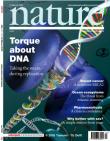 A new and fairly authoritative voice has entered the Wikipedia debate: last week, staff members of the science magazine Nature read through a series of science articles in both Wikipedia and the Encyclopedia Britannica, and decided that Britannica — the “gold standard” of reference, as they put it — might not be that much more reliable (we did something similar, though less formal, a couple of months back — read the first comment). According to an article published today:
A new and fairly authoritative voice has entered the Wikipedia debate: last week, staff members of the science magazine Nature read through a series of science articles in both Wikipedia and the Encyclopedia Britannica, and decided that Britannica — the “gold standard” of reference, as they put it — might not be that much more reliable (we did something similar, though less formal, a couple of months back — read the first comment). According to an article published today:
Entries were chosen from the websites of Wikipedia and Encyclopaedia Britannica on a broad range of scientific disciplines and sent to a relevant expert for peer review. Each reviewer examined the entry on a single subject from the two encyclopaedias; they were not told which article came from which encyclopaedia. A total of 42 usable reviews were returned out of 50 sent out, and were then examined by Nature’s news team. Only eight serious errors, such as misinterpretations of important concepts, were detected in the pairs of articles reviewed, four from each encyclopaedia. But reviewers also found many factual errors, omissions or misleading statements: 162 and 123 in Wikipedia and Britannica, respectively.
It’s interesting to see Nature coming to the defense of Wikipedia at the same time that so many academics in the humanities and social science have spoken out against it: it suggests that the open source culture of academic science has led to a greater tolerance for Wikipedia in the scientific community. Nature’s reviewers were not entirely thrilled with Wikipidia: for example, they found the Britannica articles to be much more well-written and readable. But they also noted that Britannica’s chief problem is the time and effort it takes for the editorial department to update material as a scientific field evolves or changes: Wikipedia updates often occur practically in real time.
One not-so-suprising fact unearthed by Nature’s staffers is that the scientific community contained about twice as many Wikipedia users as Wikipedia authors. The best way to ensure that the science in Wikipedia is sound, the magazine argued, is for scientists to commit to writing about what they know.
if:book
A Project of the Institute for the Future of the Book
